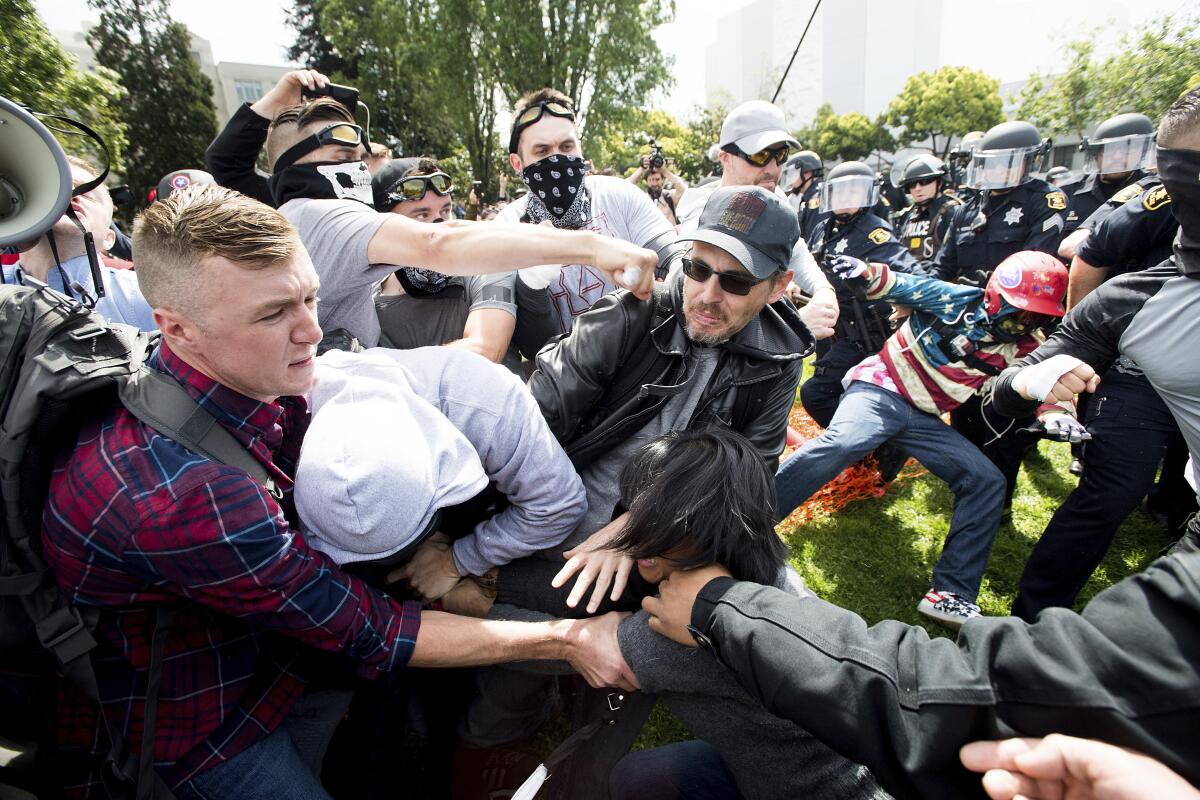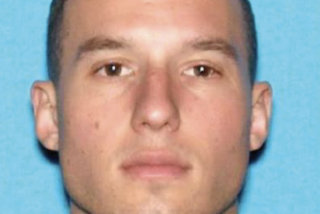Appeals court revives charges against alleged white supremacists over protest violence

A federal appeals court Thursday rejected a controversial finding by a lower court judge that found two accused white supremacists were unfairly prosecuted, ordering a new trial.
The ruling by a three-judge panel of the U.S. 9th Circuit Court of Appeals marks the second time the appellate court has reversed a decision from Judge Cormac J. Carney to dismiss the case against members of the Rise Above Movement or RAM, a Southern California white supremacist group suspected of inciting brawls at political rallies throughout the state.
Carney has issued several rulings in favor of accused RAM members, finding that prosecutors had erred by not pursuing similar charges against “far-left extremist groups, such as Antifa.”
In his February decision, Carney — who has since retired — dismissed charges against Robert Rundo, the alleged founding member of RAM, and another member, Robert Boman, agreeing that they were being selectively prosecuted.
Rundo and Boman were charged with rioting and conspiracy to violate the Anti-Riot Act.
“Prosecuting only members of the far right and ignoring members of the far left leads to the troubling conclusion that the government believes it is permissible to physically assault and injure Trump supporters to silence speech,” Carney wrote in his order.
The higher court disagreed, writing in its decision that “Rundo did not meet his burden to establish that similarly situated individuals were not prosecuted.”
Carney said he looked at six rallies where he found that members of “far-left groups” such as Antifa engaged in “the same, if not worse,” conduct as RAM.
But Judge Milan D. Smith Jr., an appointee of President George W. Bush, wrote in the appellate court’s opinion that Carney had “compared apples to oranges.” Carney, he said, had compared “collective conduct to individual conduct.”
Rundo’s federal public defenders did not immediately respond to a request for comment.
The U.S. attorney’s officein Los Angeles said in a statement that it is “committed to combating violent extremism in all its forms.”
“We are pleased with the Ninth Circuit’s decision to keep defendant Rundo in custody pending trial and look forward to proceeding with the prosecution of individuals alleged to be associated with militant white supremacy and engaged in acts of violence,” the statement read.
It’s another twist in a case that has dragged on since October 2018, when Rundo was originally charged and arrested alongside two other alleged members, Boman and Tyler Laube of Redondo Beach.
The federal indictment against Rundo alleged he and others recruited new members, coordinated training in hand-to-hand combat and traveled to political rallies to attack protesters at events across the state.
The indictment alleged that RAM members participated in attacks at political rallies in Huntington Beach on March 25, 2017; in Berkeley on April 15, 2017; and in San Bernardino on June 10, 2017. Afterward, they allegedly trained for future events and celebrated by posting photos online of their altercations.
Rundo was accused not just of organizing the violent confrontations but also of attacking protesters and police officers. After Rundo was ordered by police to stop attacking a “defenseless person” during the Berkeley protest, he allegedly punched an officer twice in the head, according to an arrest warrant.
Carney first dismissed charges in the case in 2019, after Rundo’s attorneys argued that the Anti-Riot Act was “unconstitutionally over-broad.” The 9th Circuit reinstated the charges in March 2021, finding that parts of the law were constitutional, thus landing it back before Carney.
After charges were reinstated in January 2023, Rundo eluded authorities, traveling through Europe but continuing to post images on social media, Bellingcat reported.
FBI agents caught up with him after he was located by Romanian authorities in a Bucharest neighborhood, according to an arrest warrant. Rundo was extradited from Romania last year.
In April, Carney sentenced Laube, who pleaded guilty to a misdemeanor charge for repeatedly punching a journalist, to time served — totaling 35 days he had spent in pretrial custody.
In the decision issued Thursday, Smith was joined by two liberal appointees: circuit Judge Richard A. Paez, an appointee of President Clinton, and district Judge Jon S. Tigar, an appointee of President Obama who was sitting in on the circuit court case.
Times staff writer Kevin Rector contributed to this report.
More to Read
Sign up for Essential California
The most important California stories and recommendations in your inbox every morning.
You may occasionally receive promotional content from the Los Angeles Times.











